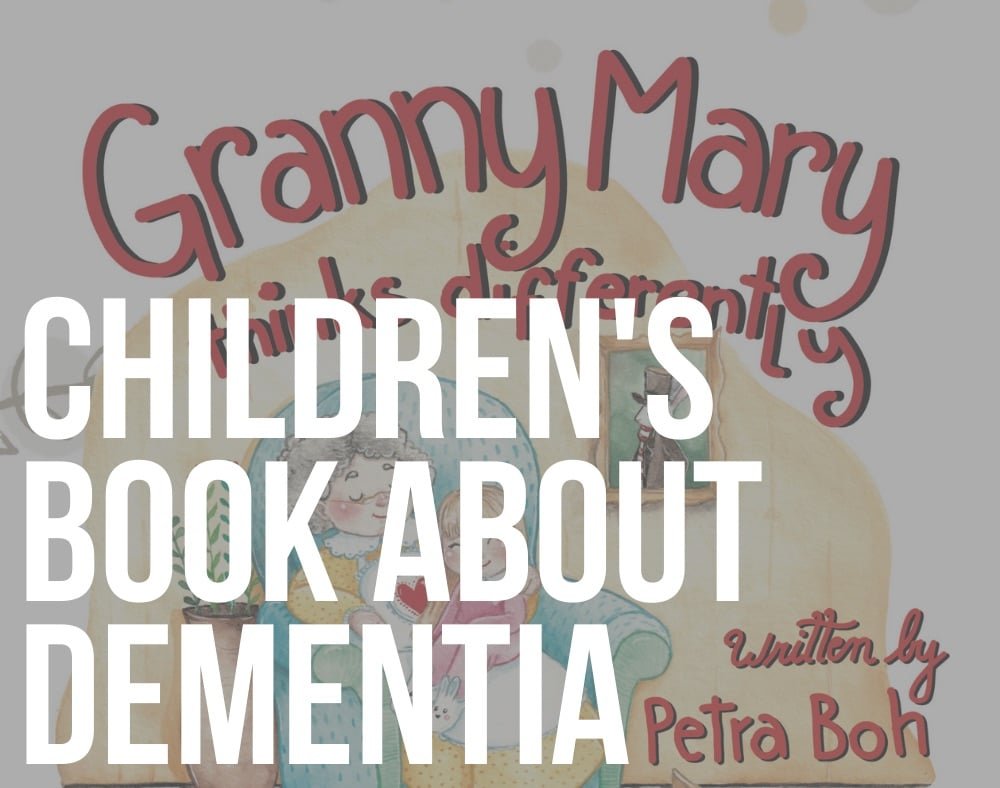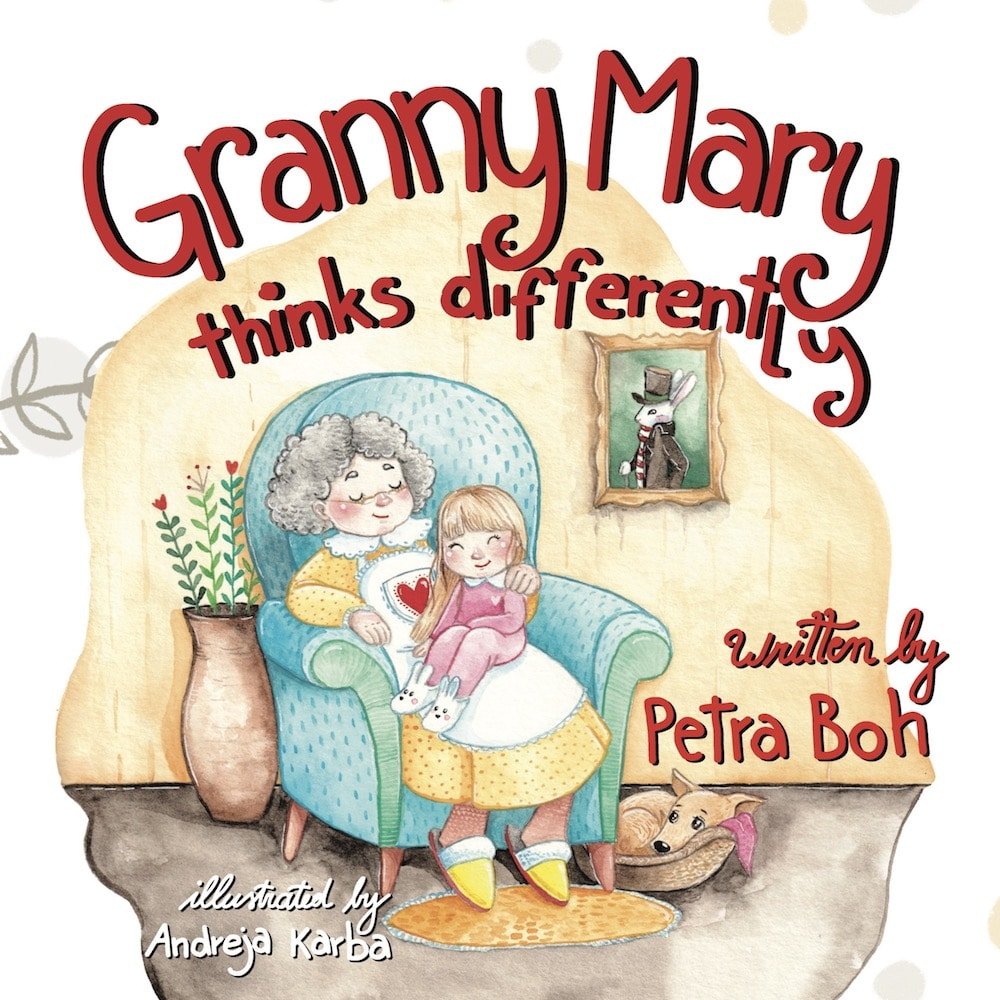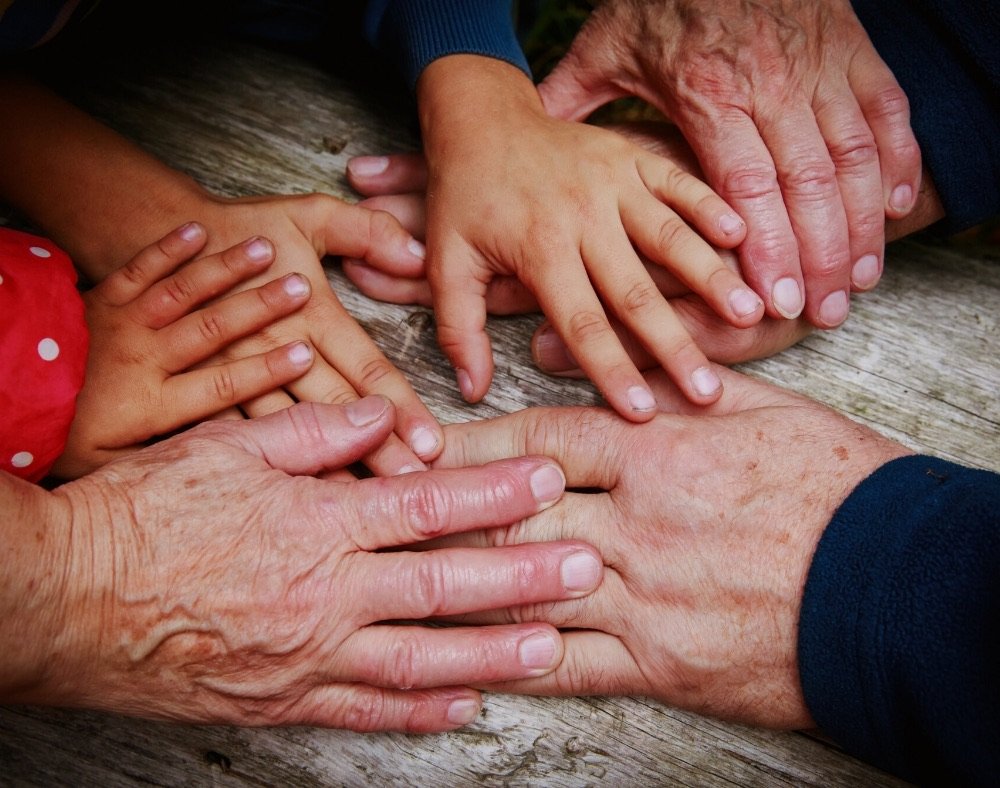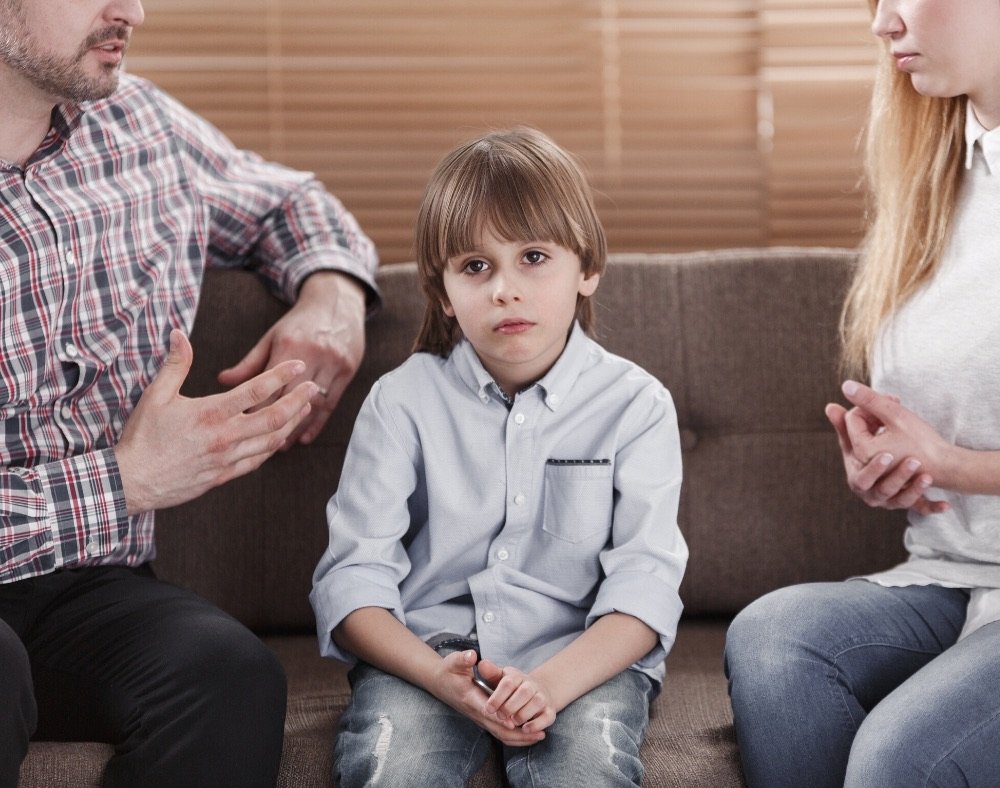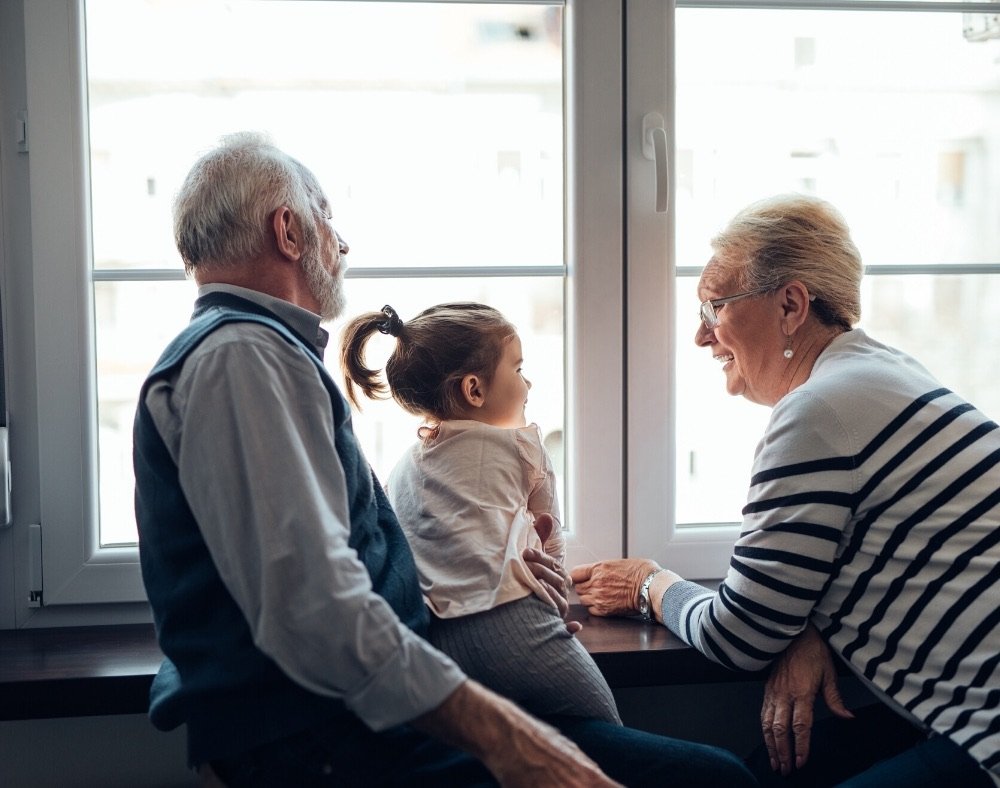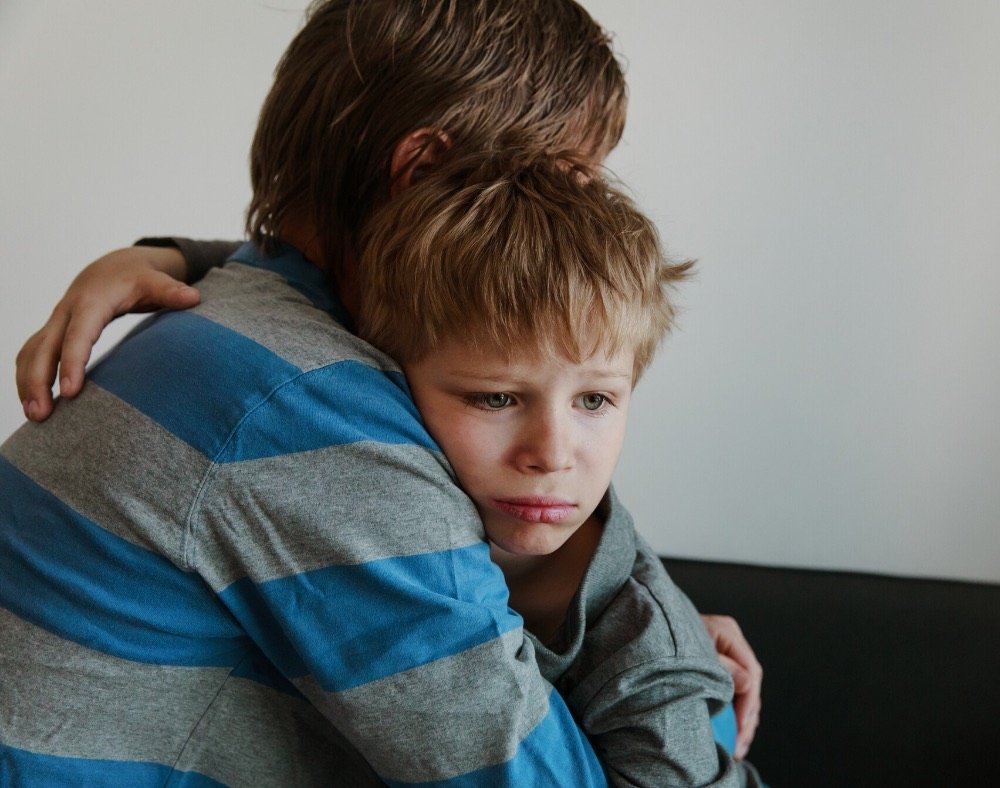We carefully reviewed 50+ dementia books for children with our little ones to pick the best 18.
Nowadays, it is a bit easier to talk to young ones about dementia and Alzheimer’s.
Which we absolutely should.
When a close relative develops dementia, it may be a confusing time for the young minds as they have to deal with all the challenges that are happening.
At this point, our kids NEED ALL THE SUPPORT they need to get through the new developments.
While it may be natural to want to protect our children, it is always best to let them know the truth in a way that they will understand.
Answer any questions the children have gently.
Remind them that their loved one is STILL a person and even though there may be changes.
Inform them that they can STILL spend quality time with their grandparents or parents but be sure to highlight boundaries so that everyone ends up having a good time.
It is also important to prepare the little ones for the unexpected, seeing that the illness comes with unpredictability.
If you are caught in a situation where you have to talk to children about dementia, there are plenty of resources you can use to your advantage.
Here is a list of the best books that will help you.
Best Alzheimer’s & Dementia Books For Children
1. Granny Mary Thinks Differently
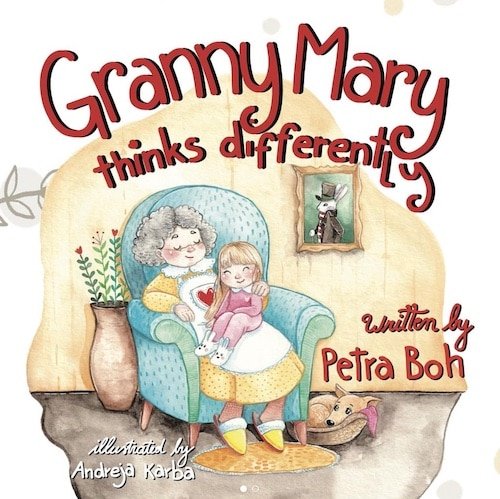
Granny Mary Thinks Differently is an adorable children’s book that looks at the experience young Anna goes through when her grandmother gets diagnosed with dementia.
Our young ones can easily relate to the different activities that a grandchild and a grandparent enjoy together. Not only through words but also through the lovely illustrations, which make Granny Mary Thinks Differently an excellent picture book about dementia.
The book ends with a compelling statement that left a strong impression on us.
[su_button url=”https://gumroad.com/l/gmtdeb” target=”blank” style=”flat” background=”#52CA70″ color=”#FFFFFF” size=”7″ radius=”3″ text_shadow=”none” rel=”nofollow” ]Buy On Book Depository[/su_button]
2. I Smile For Grandpa: A loving story about dementia disease for young children
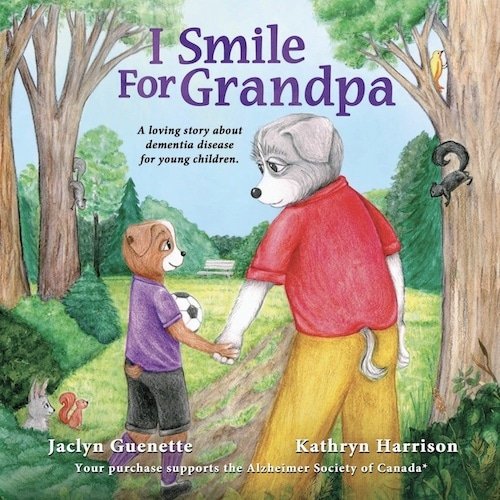
I Smile for Grandpa takes young minds through a beautiful transformational journey of a young boy (Little Buddy) and his grandpa, who has developed dementia. Little Buddy realizes that spending time with his grandpa will no longer be the same.
Written by Jaclyn Guenette and illustrated by Kathryn Harrison, the book does a great job at captivating the various behavior and emotions that people with dementia exhibit.
A great read for all ages, it offers a better understanding of dementia through the eyes of children.
It is one of the dementia books for children that offer reassurance and hope for the little ones without protecting them from the realities of the illness.
[su_button url=”https://tidd.ly/3nBIsM8″ target=”blank” style=”flat” background=”#52CA70″ color=”#FFFFFF” size=”7″ radius=”3″ text_shadow=”none” rel=”nofollow” ]Buy On Book Depository[/su_button]
3. Granny Can’t Remember Me: A Children’s Book About Alzheimer’s
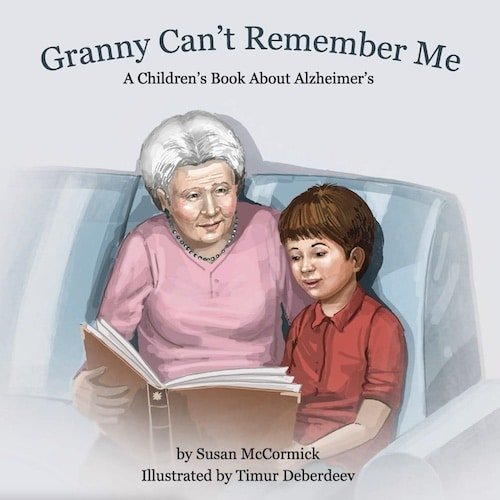
Granny Can’t Remember me is an endearing story by Susan McCormick who is an award-winning author and a doctor. It is about Joey, a 6-year-old boy and his granny.
Granny has lost her memory and can’t remember most of the things that Joey likes. However, she still spends quality time with Joey telling him stories reassuring the young man of her love.
The book offers background on Alzheimer’s disease addressing the illness warmly and sensitively.
The primary lesson children can draw from this book is that older persons with Alzheimer’s can still be loved and show love.
[su_button url=”https://tidd.ly/3Krn9qK” target=”blank” style=”flat” background=”#52CA70″ color=”#FFFFFF” size=”7″ radius=”3″ text_shadow=”none” rel=”nofollow” ]Buy On Book Depository[/su_button]
4. When My Granny Forgets, I Remember: A Child’s Perspective on Dementia
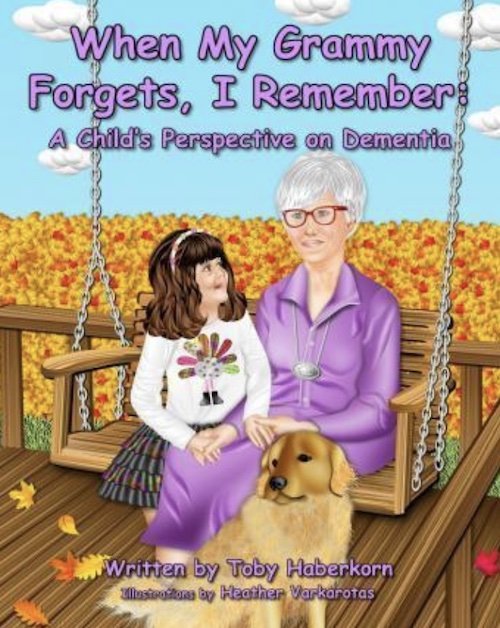
Authored by Toby Haberkorn, When My Granny Forgets, I Remember is one of the most wonderfully written dementia books for children with charming illustrations.
The book tells a story of the shifting relationship between a grandmother and her granddaughter. It starts with examples of grandma doing fun activities with her grandchild.
As time goes by, the little girl notices that her granny constantly forgets things and acts strangely.
She has a conversation with her mum and the little girl knows that her beloved grandma has a brain disease.
The sweet and short storybook is perfect for helping young kids understand the changes that people go through after developing dementia.
[su_button url=”https://tidd.ly/33w5k91″ target=”blank” style=”flat” background=”#52CA70″ color=”#FFFFFF” size=”7″ radius=”3″ text_shadow=”none” rel=”nofollow” ]Buy On Book Depository[/su_button]
5. Always My Grandpa: A Story for Children About Alzheimer’s Disease
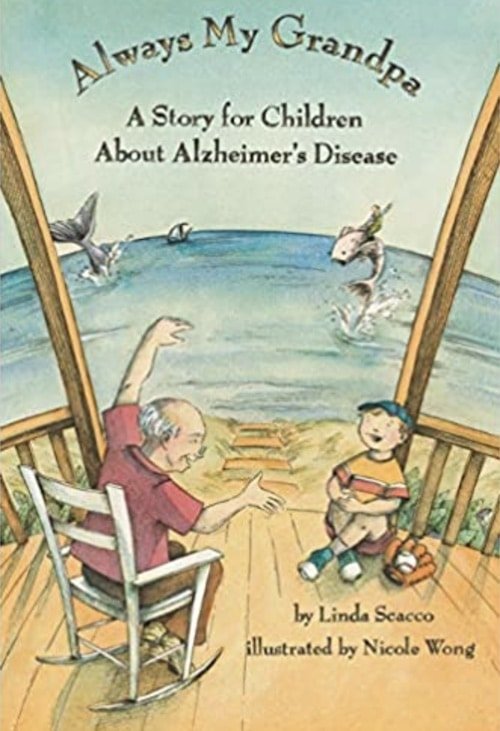
A thoughtful book, Always My Grandpa brings up various issues that people with dementia deal with. These include repeating questions, forgetfulness, and the fact that the illness can cause a person to die sooner.
It talks about Daniel and his mother and how they usually spend summer with his grandfather. Then, Grandpa begins to change, and little Daniel discovers that his grandpa has Alzheimer’s.
It is an excellent resource for kids who are watching their grandparents suffer from the disease.
While it is an easy read, Linda Scacco, the author offers a realistic explanation of a subject that can be quite difficult for youngsters.
[su_button url=”https://tidd.ly/3FGaYCw” target=”blank” style=”flat” background=”#52CA70″ color=”#FFFFFF” size=”7″ radius=”3″ text_shadow=”none” rel=”nofollow” ]Buy On Book Depository[/su_button]
6. Striped Shirts and Flowered Pants: A Story About Alzheimer’s Disease for Young Children
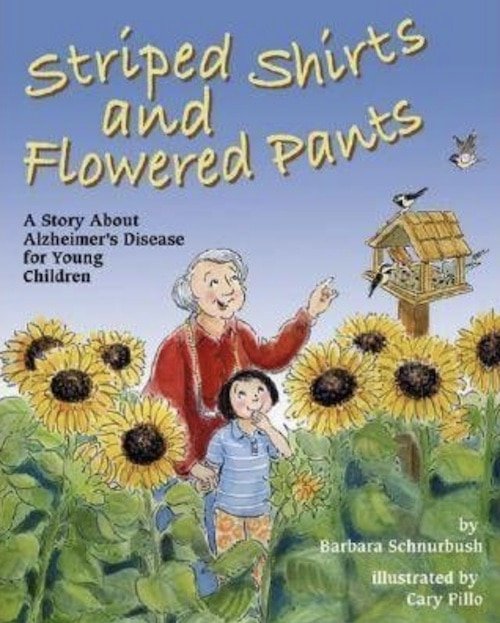
Written by Barbara Schnurbush, this is a fun book that delicately explains to young persons’ how Alzheimer’s disease can change the lives of their grandparents.
It follows the life of Libby and her nana, who start by engaging in tons of fun activities, but things start to change.
Libby learns that her nana has Alzheimer’s disease and through reassurance from her family, she learns it is okay for her grandma to wear flowered pants and striped shirts.
In as much as it is one of the helpful dementia books for children, adults can also use it to get some pointers for helping their kids deal with their worries and feelings.
[su_button url=”https://tidd.ly/3nCfZWJ” target=”blank” style=”flat” background=”#52CA70″ color=”#FFFFFF” size=”7″ radius=”3″ text_shadow=”none” rel=”nofollow” ]Buy On Book Depository[/su_button]
7. Grandma and Me: A Kid’s Guide for Alzheimer’s and Dementia
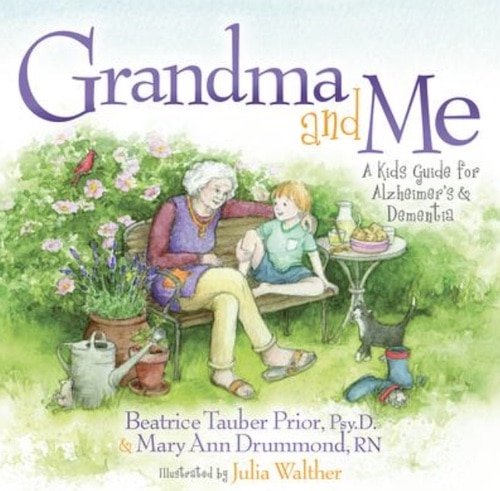
Starring Matthew, a young boy who has a special relationship with his grandmother, Grandma and Me is a collaborative effort between Beatrice Tauber, a psychologist, and Mary Ann, a registered nurse.
The book addresses Alzheimer’s disease with a lot of understanding and love focusing on the age-appropriate descriptions of the illness.
The book features attractive artwork that will grab the attention of young readers, keeping them interested in the information the book has to offer.
It gives kids useful tools to continue having loving and positive relationships with their loved ones despite the challenges that the disease brings about.
[su_button url=”https://tidd.ly/3FAd1Z3″ target=”blank” style=”flat” background=”#52CA70″ color=”#FFFFFF” size=”7″ radius=”3″ text_shadow=”none” rel=”nofollow” ]Buy On Book Depository[/su_button]
8. Weeds in Nana’s Garden: A Heartfelt Story of Love That Explain Alzheimer’s Disease and other Dementias

Weeds in Nana’s Garden is one of the dementia books for children aged between 9-12 years will enjoy. It talks about a young girl who is fond of helping her nana in the garden.
Weeds attack the garden and grandma is not sure if she should remove them. So, together with her granddaughter, they pull the tall weeds in the garden and it continues to blossom beautifully.
The book features whimsical, colorful, and bright illustrations. Other than this, it tackles the topic of Alzheimer’s disease in a heartfelt and provocative manner.
Kathryn Harrison (author) does a great job at fostering compassion and sympathy by harmoniously blending emotional engagement, inspiration, and education.
[su_button url=”https://www.bookdepository.com/Weeds-in-Nanas-Garden-Kathryn-Harrison/9780994946706″ target=”blank” style=”flat” background=”#52CA70″ color=”#FFFFFF” size=”7″ radius=”3″ text_shadow=”none” rel=”nofollow” ]Buy On Book Depository[/su_button]
9. Why Did Grandma Put Her Underwear in the Refrigerator? : An Explanation of Alzheimer’s Disease for Children
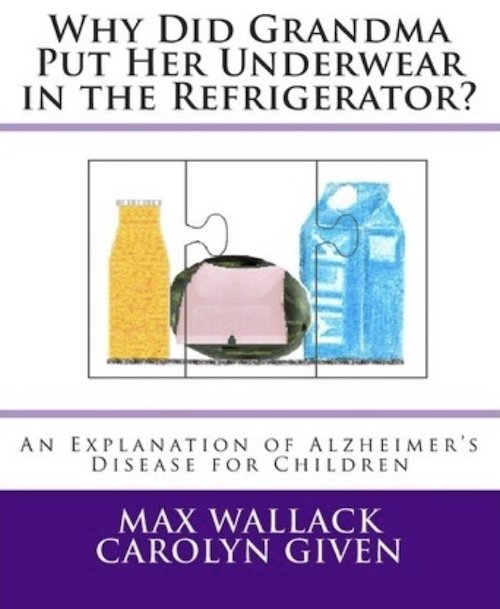
Why Did Grandma Put Her Underwear in the Refrigerator is a book told from the point of view of Julie, a 7-year-old girl.
Julie lives with her grandma, who has developed Alzheimer’s disease. The dynamics of Julie’s relationship with her nana end up changing when they can no longer enjoy their past activities.
The young girl comes up with new ways to maintain her relationship with grandma.
The simple yet relatable book by Carolyn Given and Max Wallack presents several embarrassing and stressful situations that a family may have to deal with when taking care of a person who has Alzheimer’s and how to address them in the best possible way.
[su_button url=”https://tidd.ly/3rBFdpw” target=”blank” style=”flat” background=”#52CA70″ color=”#FFFFFF” size=”7″ radius=”3″ text_shadow=”none” rel=”nofollow” ]Buy On Book Depository[/su_button]
10. My Book About Brains, Change, and Dementia: What is Dementia and What Does it Do?
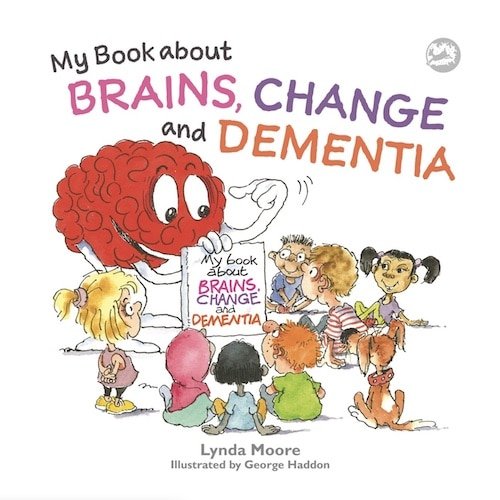
Thoughtfully written by Lynda Moore, My Book about Brains, Change, and Dementia is a great read for preschoolers and adults alike. It is one of the dementia books for children that simplify dementia without disguising the illness.
It explains various concepts of the disease, including functions of the brain and how the disease progresses.
The book does a great job of breaking down dementia misconceptions. It also includes two pages on death that readers can skip if the little angels cannot understand the concept.
The book ends with a question section that kids and adults can deliberate over.
[su_button url=”https://tidd.ly/33tbjeV” target=”blank” style=”flat” background=”#52CA70″ color=”#FFFFFF” size=”7″ radius=”3″ text_shadow=”none” rel=”nofollow” ]Buy On Book Depository[/su_button]
11. Can I Tell You About Dementia: A Guide for Family, Friends, and Carers

Offering a fresh approach to dementia, Can I Tell You About Dementia is one of the books that offer a simple guide to dementia for both adults and children.
This is done through the experience of Jack, an older man who is living with dementia. He lets readers into his world, talking about the challenges that people with the disease face.
The first-person approach in this piece makes the details more personal.
The book also features a couple of informative pages that explain an overview of different dementia types, figures, facts, dementia-friendly environments, and resources that people with the illness will find useful.
[su_button url=”https://tidd.ly/33th2Bi” target=”blank” style=”flat” background=”#52CA70″ color=”#FFFFFF” size=”7″ radius=”3″ text_shadow=”none” rel=”nofollow” ]Buy On Book Depository[/su_button]
12. What Happens When My Grandparent Has Alzheimer’s Disease?

An insightful book with 24 pages, this is one of the dementia books for children ideal for young boys and girls aged 7-10 years.
Christine Honders (author) has crafted the book so that young readers can understand what Alzheimer’s disease is. She uses simple language that all readers can easily understand.
It also offers healthy coping strategies that the young ones can use when someone they love deals with the disease.
The book has been skillfully illustrated with suitable images and text aid readers that help give a better picture of the illness and the changes that will come along.
[su_button url=”https://tidd.ly/3AkjxlG” target=”blank” style=”flat” background=”#52CA70″ color=”#FFFFFF” size=”7″ radius=”3″ text_shadow=”none” rel=”nofollow” ]Buy On Book Depository[/su_button]
13. Sometimes Even Elephants Forget: A Story About Alzheimer’s Disease for Young Children

A charming book by Kathleen Welch, Sometimes Even Elephants Forget presents an enlightening story about dementia. It provides a wonderful tale that resonates with kids of all ages.
Welch illustrates some of the communication and behavioral changes that persons with Alzheimer’s disease face. She delicately does this in a way that young kids can accept and understand.
The book beautifully captures the challenges of the illness. It offers readers an enjoyable view of the patience and kindness people can exercise when facing behavior from grandparents.
It also has pretty amazing drawings that will keep readers interested from the beginning to the end.
[su_button url=”https://tidd.ly/3IfiBBJ” target=”blank” style=”flat” background=”#52CA70″ color=”#FFFFFF” size=”7″ radius=”3″ text_shadow=”none” rel=”nofollow” ]Buy On Book Depository[/su_button]
14. Fishing with Grandpa: A Children’s Story About Alzheimer’s
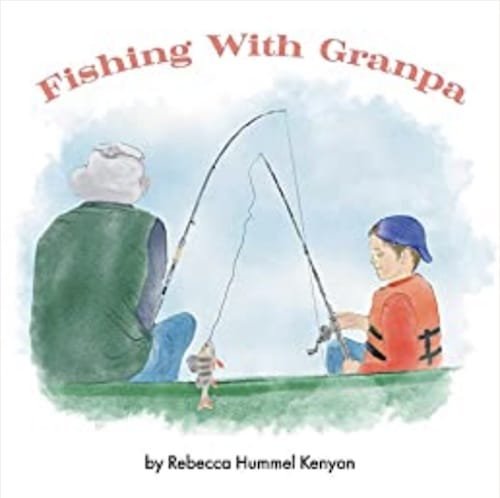
In Fishing with Grandpa, a young boy recounts some pleasant memories where he spends his summers with his grandpa. They go out to sea to fish and engage in conversations.
When his grandpa gets Alzheimer’s, he can no longer go out on their fishing trips or carry out conversations as they did in the past.
The book written by Rebecca Hummel Kenyon explains the effects that Alzheimer’s has on young kids.
These include the symptoms that affected persons have and how children can cope with the changes.
It is one of the dementia books for children that is quite an eye-opener for both adult and young readers.
[su_button url=”https://tidd.ly/3Akk4nG” target=”blank” style=”flat” background=”#52CA70″ color=”#FFFFFF” size=”7″ radius=”3″ text_shadow=”none” rel=”nofollow” ]Buy On Book Depository[/su_button]
15. The World’s Greatest Grandpa: A Children’s Guide to Understanding Alzheimer’s Disease

The World’s Greatest Grandpa is an incredible book that gives a good sense of what Alzheimer’s disease is all about.
It is centered on Quincy, a young boy who is 8 years old, and his relationship with his grandpa, who suffers from Alzheimer’s disease.
It lets young kids understand why their grandparents may be behaving differently when they get dementia. The book not only teaches young ones about brain disease but also teaches caring and compassion for the elderly.
To give the readers more information, the book offers a list of credible resources and a glossary of terms at the end.
[su_button url=”https://tidd.ly/3rpcd42″ target=”blank” style=”flat” background=”#52CA70″ color=”#FFFFFF” size=”7″ radius=”3″ text_shadow=”none” rel=”nofollow” ]Buy On Book Depository[/su_button]
16. Big Momma’s Sweet Potato Pies: A Children’s Guide to Understanding Alzheimer’s Disease
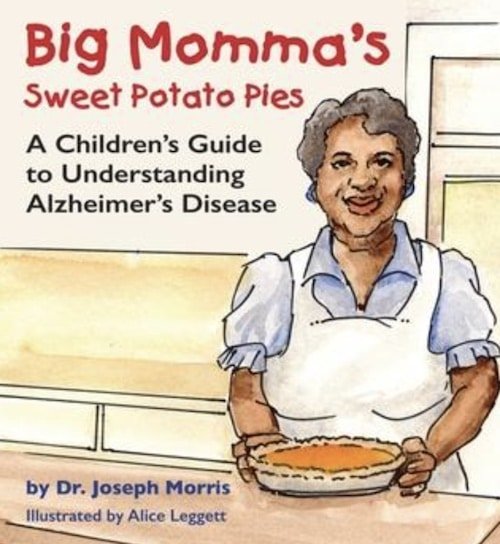
Big Momma’s Sweet Potato Pies is an incredible book authored by Dr. Joseph Morris. It tells a story of a sweet grandma who is known for her delicious sweet potato pies.
However, she can no longer make the potato pies when she develops Alzheimer’s disease and the illness starts progressing.
Grandma no longer remembers the recipe, and she is not even safe working in the kitchen alone. However, her sister steps in and offers a hand.
Big Momma’s passion and hard work grow to make significant support to doctors and scientists working hard to discover an Alzheimer’s disease cure.
This is one of the dementia books for children with creative and colorful illustrations to keep things interesting.
[su_button url=”https://tidd.ly/3rzbVb3″ target=”blank” style=”flat” background=”#52CA70″ color=”#FFFFFF” size=”7″ radius=”3″ text_shadow=”none” rel=”nofollow” ]Buy On Book Depository[/su_button]
17. Understanding Alzheimer’s: A Coloring Book for Children
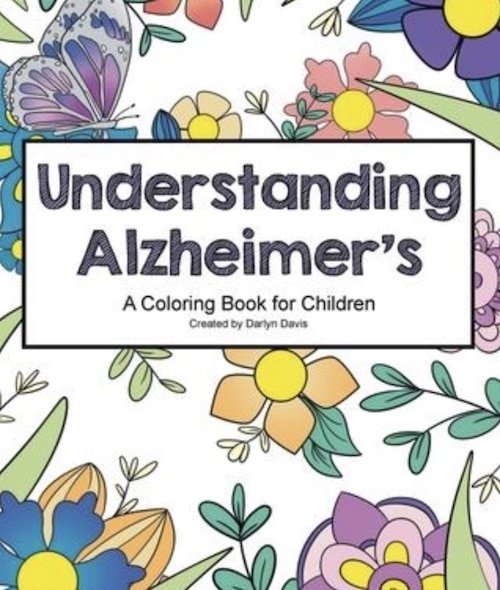
Written by Darlyn Davis, Understanding Alzheimer’s is one of the most interesting books that kids can use to learn about the progressive illness.
She came up with the idea for the book after watching her great-grandma suffer from Alzheimer’s disease. She went on to be an advocate for research and awareness by volunteering with assisted living homes and the Alzheimer’s Association.
The book offers readers an opportunity to have fun as they learn about the disease and its effects it has on our little ones. The book mostly focuses on introducing Alzheimer’s indicators.
This is presented in a fun way, so that young kids get an insight into how to identify the illness.
[su_button url=”https://tidd.ly/3qHl5D8″ target=”blank” style=”flat” background=”#52CA70″ color=”#FFFFFF” size=”7″ radius=”3″ text_shadow=”none” rel=”nofollow” ]Buy On Book Depository[/su_button]
18. What’s Wrong With Grandpa? A Children’s Story About Alzheimer’s Disease

Based on a true story, What’s Wrong with Grandpa is one of the must-read books for anyone looking to educate kids on Alzheimer’s disease and other dementia types.
It focuses on a loving relationship between a grandfather and Daisy, a ten-year-old young girl. Grandpa is diagnosed with Alzheimer’s and Daisy is disheartened to see her grandfather go through multiple changes.
He becomes more forgetful and confused while spending time with her granddaughter.
The book brings out a great transformational relationship between granddaughter and grandfather through Daisy’s tenderness and love.
Authored by Danielle Cohen, this is one of the dementia books for children ideal for young ones between the ages of 6 to 8.
[su_button url=”https://tidd.ly/3qEwqn8″ target=”blank” style=”flat” background=”#52CA70″ color=”#FFFFFF” size=”7″ radius=”3″ text_shadow=”none” rel=”nofollow” ]Buy On Book Depository[/su_button]


